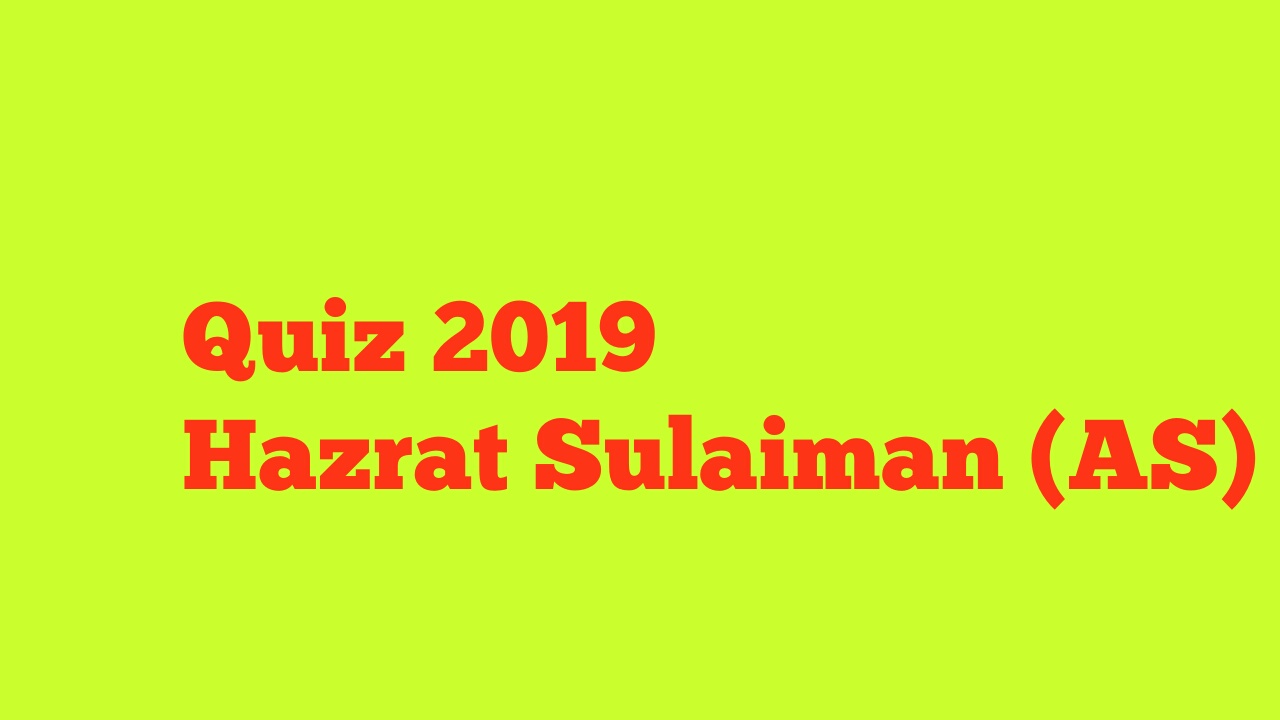Answers of Quiz 1624 (Imam Shafi Special)
1. In August 767 CE
Gaza, Palestine
2. Abu Abdullah Muhammad ibn Idris al-Shafi
3. Arab
4. At 7 years age
5. (D) 15 years
6. Imam Malik bin Anas
7. Ijtihad
8. Shafi Fiqh
9. Najran
10. When he was appointed Governor of Najran, he proved to be a just administrator, but soon became entangled with factional jealousies. In 803 CE, he was accused of aiding the 'Alawīs in a revolt, and was thus summoned in chains with a number of 'Alawis to the Caliph Harun ar-Rashid at Raqqa. Whilst other conspirators were put to death, his own eloquent defense convinced the Caliph to dismiss the charge. Other accounts state that the famous Hanafi jurist, Muḥammad ibn al-Ḥasan al-Shaybānī, was present at the court and defended him as a well-known student of the sacred law. What was certain was that the incident brought him in close contact with al-Shaybānī, who would soon become his teacher. It was also postulated that this unfortunate incident impelled him to devote the rest of his career to legal studies, never again to seek government service.
11. Imam Ahmed bin Hanbal
12. Risalah: Usul al Fiqh, Kitab al-Umm, Masnad
13. On 30 Rajab-ul-Murajjab / 19 of January 820 CE, al-Fustat, Egypt
14. 52 years
15. Shaikh-ul-Islam
16. The Shafi school predominantly relies on the Quran and the Hadiths for Sharia. Where passages of Quran and Hadiths are ambiguous, the school first seeks religious law guidance from Ijma – the consensus of Sahabah (Muhammad's companions). If there was no consensus, the Shafi'i school relies on individual opinion (Ijtihad) of the companions of Muhammad, followed by analogy.
17. One of the many differences between the Shafi'i and Hanafi schools is that the Shafi'i school does not consider Istihsan (the personal preference of Islamic legal scholars) as an acceptable source of religious law because it amounts to "human legislation" of Islamic law.
18. (D) 4th
19. The Shafi'i school is now predominantly found in Somalia, Eritrea, Ethiopia, Djibouti, eastern Egypt, the Swahili coast, Yemen, Kurdish regions of the Middle East, Dagestan, Chechen and Ingush regions of the Caucasus, Palestine, Lebanon, Indonesia, Malaysia, Maldives, some coastal parts of Sri Lanka, India, Singapore, Myanmar, Thailand, Brunei, and the Philippines.
20. Al-Ghazali, Fakhr al-Din al-Razi, Ibn Kathir, Al-Suyuti, Ibn Majah, Al-Bayhaqi, Ibn Hajar al-Asqalani, Al-Qastallani, Baidawi, Shams Tabrizi, Salahuddin Ayubi, Nizam-ul-Mulk
Gaza, Palestine
2. Abu Abdullah Muhammad ibn Idris al-Shafi
3. Arab
4. At 7 years age
5. (D) 15 years
6. Imam Malik bin Anas
7. Ijtihad
8. Shafi Fiqh
9. Najran
10. When he was appointed Governor of Najran, he proved to be a just administrator, but soon became entangled with factional jealousies. In 803 CE, he was accused of aiding the 'Alawīs in a revolt, and was thus summoned in chains with a number of 'Alawis to the Caliph Harun ar-Rashid at Raqqa. Whilst other conspirators were put to death, his own eloquent defense convinced the Caliph to dismiss the charge. Other accounts state that the famous Hanafi jurist, Muḥammad ibn al-Ḥasan al-Shaybānī, was present at the court and defended him as a well-known student of the sacred law. What was certain was that the incident brought him in close contact with al-Shaybānī, who would soon become his teacher. It was also postulated that this unfortunate incident impelled him to devote the rest of his career to legal studies, never again to seek government service.
11. Imam Ahmed bin Hanbal
12. Risalah: Usul al Fiqh, Kitab al-Umm, Masnad
13. On 30 Rajab-ul-Murajjab / 19 of January 820 CE, al-Fustat, Egypt
14. 52 years
15. Shaikh-ul-Islam
16. The Shafi school predominantly relies on the Quran and the Hadiths for Sharia. Where passages of Quran and Hadiths are ambiguous, the school first seeks religious law guidance from Ijma – the consensus of Sahabah (Muhammad's companions). If there was no consensus, the Shafi'i school relies on individual opinion (Ijtihad) of the companions of Muhammad, followed by analogy.
17. One of the many differences between the Shafi'i and Hanafi schools is that the Shafi'i school does not consider Istihsan (the personal preference of Islamic legal scholars) as an acceptable source of religious law because it amounts to "human legislation" of Islamic law.
18. (D) 4th
19. The Shafi'i school is now predominantly found in Somalia, Eritrea, Ethiopia, Djibouti, eastern Egypt, the Swahili coast, Yemen, Kurdish regions of the Middle East, Dagestan, Chechen and Ingush regions of the Caucasus, Palestine, Lebanon, Indonesia, Malaysia, Maldives, some coastal parts of Sri Lanka, India, Singapore, Myanmar, Thailand, Brunei, and the Philippines.
20. Al-Ghazali, Fakhr al-Din al-Razi, Ibn Kathir, Al-Suyuti, Ibn Majah, Al-Bayhaqi, Ibn Hajar al-Asqalani, Al-Qastallani, Baidawi, Shams Tabrizi, Salahuddin Ayubi, Nizam-ul-Mulk


Comments
Post a Comment